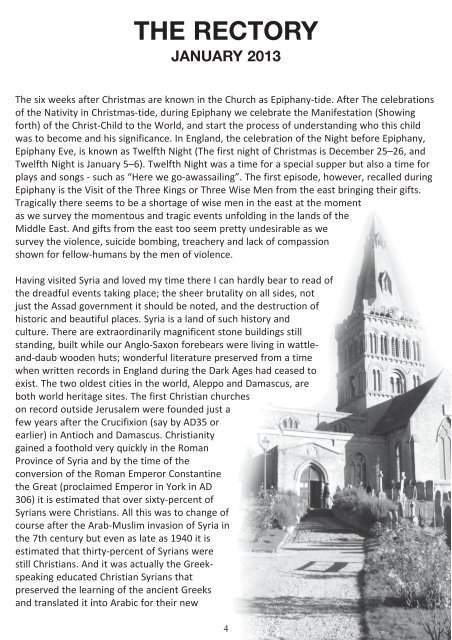PARISH NEWS - Castor Church
PARISH NEWS - Castor Church
PARISH NEWS - Castor Church
You also want an ePaper? Increase the reach of your titles
YUMPU automatically turns print PDFs into web optimized ePapers that Google loves.
THE RECTORY<br />
JANUARY 2013<br />
The six weeks after Christmas are known in the <strong>Church</strong> as Epiphany-tide. After The celebrations<br />
of the Nativity in Christmas-tide, during Epiphany we celebrate the Manifestation (Showing<br />
forth) of the Christ-Child to the World, and start the process of understanding who this child<br />
was to become and his significance. In England, the celebration of the Night before Epiphany,<br />
Epiphany Eve, is known as Twelfth Night (The first night of Christmas is December 25–26, and<br />
Twelfth Night is January 5–6). Twelfth Night was a time for a special supper but also a time for<br />
plays and songs - such as “Here we go-awassailing”. The first episode, however, recalled during<br />
Epiphany is the Visit of the Three Kings or Three Wise Men from the east bringing their gifts.<br />
Tragically there seems to be a shortage of wise men in the east at the moment<br />
as we survey the momentous and tragic events unfolding in the lands of the<br />
Middle East. And gifts from the east too seem pretty undesirable as we<br />
survey the violence, suicide bombing, treachery and lack of compassion<br />
shown for fellow-humans by the men of violence.<br />
Having visited Syria and loved my time there I can hardly bear to read of<br />
the dreadful events taking place; the sheer brutality on all sides, not<br />
just the Assad government it should be noted, and the destruction of<br />
historic and beautiful places. Syria is a land of such history and<br />
culture. There are extraordinarily magnificent stone buildings still<br />
standing, built while our Anglo-Saxon forebears were living in wattleand-daub<br />
wooden huts; wonderful literature preserved from a time<br />
when written records in England during the Dark Ages had ceased to<br />
exist. The two oldest cities in the world, Aleppo and Damascus, are<br />
both world heritage sites. The first Christian churches<br />
on record outside Jerusalem were founded just a<br />
few years after the Crucifixion (say by AD35 or<br />
earlier) in Antioch and Damascus. Christianity<br />
gained a foothold very quickly in the Roman<br />
Province of Syria and by the time of the<br />
conversion of the Roman Emperor Constantine<br />
the Great (proclaimed Emperor in York in AD<br />
306) it is estimated that over sixty-percent of<br />
Syrians were Christians. All this was to change of<br />
course after the Arab-Muslim invasion of Syria in<br />
the 7th century but even as late as 1940 it is<br />
estimated that thirty-percent of Syrians were<br />
still Christians. And it was actually the Greekspeaking<br />
educated Christian Syrians that<br />
preserved the learning of the ancient Greeks<br />
and translated it into Arabic for their new<br />
4


